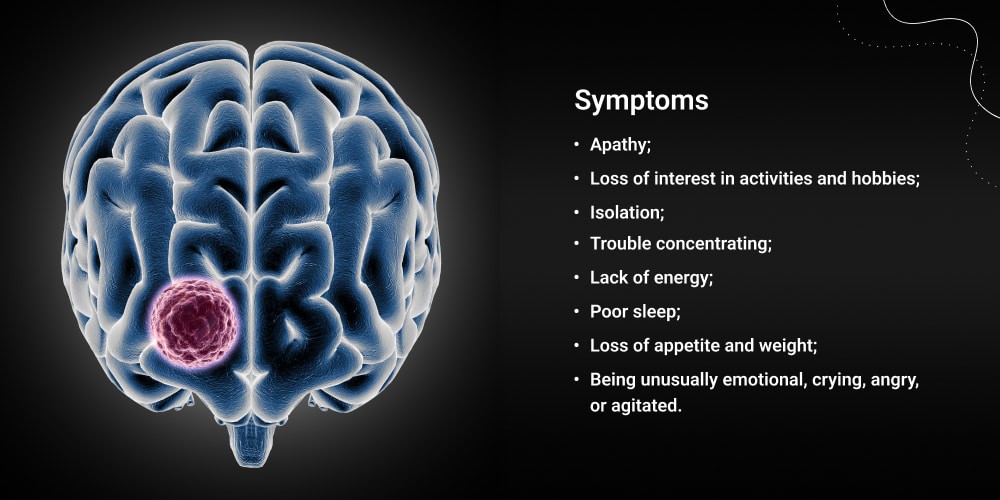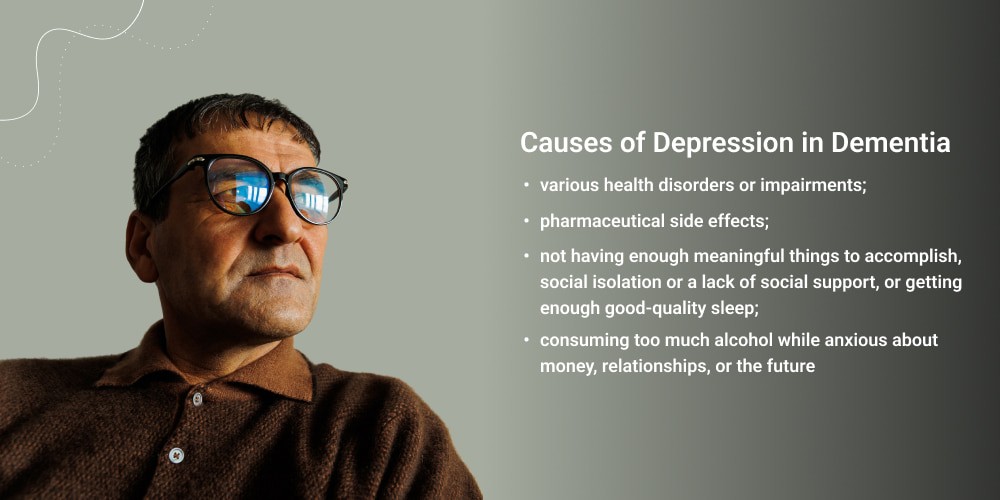Dementia is characterised by the degradation of memory, thinking, behavior and ability to perform daily activities. Everyone experiences extreme emotional suffering from time to time; it might be a one-time incident or even depression, which is a strong predictor of dementia. In general, depression is a chronic illness that might last for weeks or months. When a person is depressed, they may experience negative emotions, including sadness, despair, and a loss of interest in previously appreciated activities.
It is estimated that about 10% of people aged 65 and over suffer from dementia.
How to know someone is depressed? Overall, the symptoms of depression in a healthy person are similar to those of a person suffering from dementia, although there are some minor but significant distinctions. The likelihood of developing dementia increases with age: among people in the age group of 65 to 74 years, about 5% of people suffer from dementia, and among people aged 85 years and older, about 30% of people suffer from dementia. Very rarely, dementia is found in people under 60 years of age.
As previously noted, depression is widespread in dementia patients, particularly in the early and middle stages. According to medical research, around 40% of people with this syndrome suffer from depression. In this article, Lone Star Neurology will discuss the symptoms, causes, diagnosis, and therapy of depression in dementia.
How to Determine Depression in Dementia
Depression may impact people in various ways. There are four main stages of depression: denial and isolation, anger, bargaining, and eventually acceptance. Common symptoms include feeling depressed, hopeless, or irritated over long periods. A person may lose interest or pleasure in previously favorite activities, feel worthless, guilty, or lack self-confidence.
There are many forms of dementia. Alzheimer’s disease is the most common form, accounting for 60-70% of all cases. Other common forms include vascular dementia, Lewy body dementia (abnormal protein inclusions that form inside nerve cells), and a group of diseases that contribute to frontotemporal dementia (degeneration of the frontal lobe of the brain).
According to one study, people who developed depression later in life had a 70% greater chance of dementia, while those who had been depressed since middle age had an 80% increased risk. Researchers have connected depression and dementia for a long time.
Common Symptoms of Depression and Dementia
The following symptoms are common in both depression and dementia. They mainly include isolation, memory and attention problems:
- Apathy
- Loss of interest in activities and hobbies
- Isolation
- Trouble concentrating
- Lack of energy
- Poor sleep
- Loss of appetite and weight
- Being unusually emotional, crying, angry, or agitated
Now, let’s consider these symptoms in more detail:
- Apathy
An apathetic person suffering from depression and dementia will be less prone to engage in activities. They may also lack the energy and enthusiasm to do routine or everyday duties and rely on other people to plan and organize activities. They are not concerned about their issues or react emotionally to news or events.
- Loss of interest in activities and hobbies
Loss of interest in previously enjoyed activities and hobbies is a significant symptom of depression. As a result, you appear to be disconnecting from reality into a more passive period of life.
- Isolation
Some people separate themselves from society, avoiding their friends, family, and formerly favorite pastime. According to research, the more people you communicate with, the slower the emergence of cognitive problems you have in this syndrome.
- Trouble concentrating
A person with dementia who is depressed may have poor health as well as problems with their thinking and memory. It will be more difficult for a person to focus on completing a basic regular activity.
- Lack of energy
Some people get tired a lot faster when they are depressed. They may say that they don’t have any energy. Depressed persons with dementia have agitation and restlessness feelings. Complaints and worries about a variety of physical conditions might be indicators of depression.
- Poor sleep
Excessive sleep and difficulties falling or staying asleep can be symptoms of depression in dementia. The individual will sleep badly and will not get enough sleep.
- Loss of appetite and weight
Depression with dementia might present itself in the patient’s eating habits. They tell that nothing tastes delicious now. A reduction in appetite can be caused by other medical illnesses, so mention this symptom to your doctor.
- Being unusually emotional, crying, angry, or agitated
Significant distinctions between the symptoms of depression and dementia
However, there are significant distinctions between the symptoms of depression and dementia.
- Depression progresses faster than other kinds of dementia. Dementia patients frequently experience difficulties with their speech and understanding of where they are and what time it is. This is rare in the case of depression.
- A depressed individual may pretend they can’t recall something but then recollect it when questioned. A person suffering from depression and dementia is unlikely to recall recent events and may attempt to conceal their memory loss.
- A person suffering from severe depression may experience difficulties with logic or remembering. However, this is most likely due to their lack of concentration. Their thinking and memory impairments should be improved with a special therapy
Causes of Depression in Dementia
If a person has already experienced depression, they are more likely to experience it again if they get dementia. Depression frequently has several causes, which vary greatly from person to person, including:
- Various health disorders or impairments (heart problems, breathing difficulties, chronic pain) and a history of traumatic or other diseases;
- Alzheimer’s disease;
- Arterial thrombosis;
- Severe atherosclerotic lesions of the neck and brain vessels;
- Pharmaceutical side effects;
- Social isolation or a lack of social support, or getting enough good-quality sleep;
- Consuming too much alcohol without worrying about money, relationships, or the future.
Take into account the answer to the question “Can depression cause dementia?” Everyone experiences extreme emotional suffering from time to time; it might be a one-time incident or even depression, which is a strong predictor of dementia. Several studies have suggested that a very stressful incident may increase the risk of dementia.
Additionally, vascular disease, glucocorticoid hormone abnormalities, hippocampus shrinkage, amyloid plaques increased accumulation, inflammatory changes, and nerve growth factor abnormalities are among the possible molecular processes connecting depression to dementia.
Depression with Dementia Diagnosis
A thorough examination by a medical professional is essential for diagnosis. There is no one-size-fits-all questionnaire for the diagnosis of depression in dementia.
- However, there is the Cornell Screen for Depression in Dementia. It includes a series of questions that a person must respond to. It has questions about their appetite, weight loss, emotions, sleep, medical ailments, and behavior. A score of 18 or even above suggests severe depression, whereas a score of 10 or higher implies likely depression.
It is important to visit a senior psychiatrist who identifies and treats depression in older people. A medical history review, cognitive and emotional assessment, and conversations with family members who know the client well are all part of a depression evaluation.
How to Treat Depression in Dementia Patients
Although there is no actual way to avoid dementia as well as there is no depression in dementia treatment, patients may be able to minimize their risk by not just mild to moderate depression, but also by engaging in healthy lifestyle behaviors like exercising, eating a balanced diet, and maintaining their minds busy with social events and games. Understanding they are at high risk for dementia might also help you and your family plan for it, making it less of a surprise later on.
It is rarely beneficial to induce a person with this syndrome, telling them to “cheer up,” “snap out of it,” or “try harder.” Depressed people are rarely able to recover on their own, or without a lot of support, encouragement, and expert care.
If they are suffering from moderate depression, they may be provided with a support group or self-help activities and approaches. If a patient’s depression is severe or chronic, their doctor may prescribe an antidepressant in addition to sending them to talk therapy.
Bottom Line
Most people experience attacks of sadness from time to time. When a person is depressed, however, a variety of bad sensations can take over their life, including melancholy, hopelessness, and a loss of interest in activities they used to love. Depression with dementia in patients has additional considerations, which Lone Star Neurology has discussed in this article.
FAQs
- How does depression affect a person with dementia?
Although depression affects mood, it can also cause impaired memory, poor concentration, and trouble making decisions, organizing, and beginning tasks. Depression not only impacts a person with dementia’s mood, but it may also increase their dementia symptoms.
- Is depression common in dementia patients?
Dementia patients frequently experience depression. Depressive symptoms are thought to affect roughly 20-30% of persons with dementia. People in long-term residential care tend to be more vulnerable to depression.
- What is the difference between dementia delirium and depression?
Delirium strikes suddenly (over a few hours or days), and the symptoms change throughout the day. Depression is defined as a negative change in mood that has lasted at least two weeks, whereas dementia develops gradually and insidiously.
- Can dementia be caused by emotional trauma?
Several studies have suggested that a very stressful incident may increase the risk of dementia.
- Does depression occur in the early stages of dementia?
Depression is frequently recognized in the early stages of dementia. It can develop at any point.














Please, leave your review
Write a comment: